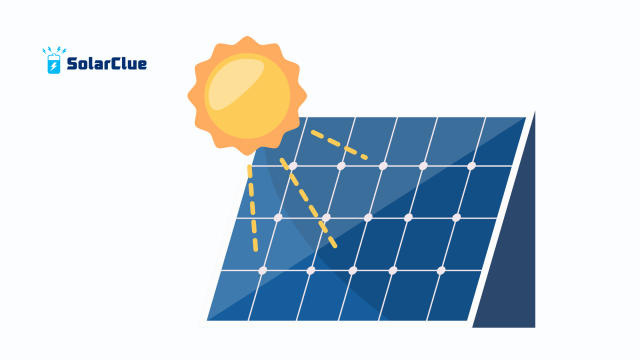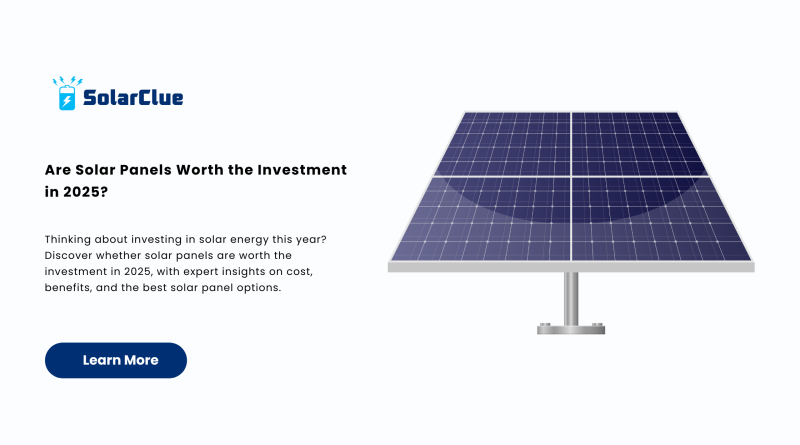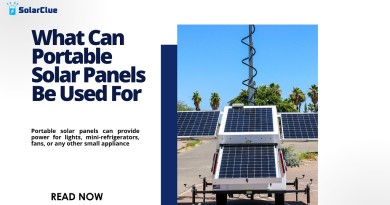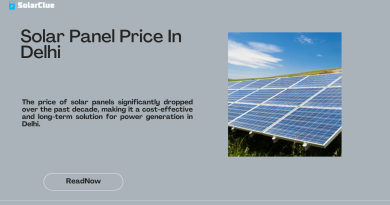Are Solar Panels Worth the Investment in 2025?
In 2025, the push for clean, renewable energy is stronger than ever. With climate change becoming a global concern and electricity prices steadily increasing, more homeowners are asking: Are solar panels worth the investment in 2025? The short answer is yes—but let’s explore why that’s the case.
Table of Contents
- 1 What Are Solar Panels and How Do They Work?
- 2 Benefits of Investing in Solar Panels in 2025
- 3 Breaking Down the Solar Panel Price in 2025
- 4 Return on Investment (ROI) From Solar Panels
- 5 Factors Affecting Solar Panel ROI in 2025
- 6 Choosing the Best Solar Panel in 2025
- 7 Are Solar Panels Worth It in Urban Areas?
- 8 What About Rural Areas?
- 9 Environmental Impact of Solar Panels
- 10 Innovations in Solar Technology in 2025
- 11 Common Myths About Solar Panels Debunked
- 12 How to Get Started With Solar Panels
- 13 The Future of Solar Panels
- 14 Final Verdict: Are Solar Panels Worth the Investment in 2025?
- 15 FAQs
What Are Solar Panels and How Do They Work?
Solar panels convert sunlight into electricity using photovoltaic (PV) cells. These cells absorb sunlight and produce direct current (DC) electricity, which is then converted into alternating current (AC) electricity via an inverter—powering your home with clean, sustainable energy.
Benefits of Investing in Solar Panels in 2025
1. Long-Term Cost Savings
The biggest reason homeowners are installing solar panels for home is the significant reduction in electricity bills. Once installed, solar systems can generate power for over 25 years.
2. Government Incentives & Subsidies
In 2025, the Indian government and many state governments continue to offer lucrative subsidies, tax benefits, and net metering incentives that lower solar panel price and make installation more affordable.
3. Increased Property Value
Homes equipped with solar panels for house setups often have higher resale value, making solar a wise real estate investment.
4. Eco-Friendly Energy Solution
Switching to solar reduces your carbon footprint and dependence on non-renewable resources.
Breaking Down the Solar Panel Price in 2025
Initial Cost Analysis
As of 2025, the solar panel price in India has dropped significantly due to better technology and government support. On average, residential systems cost between ₹40,000 to ₹60,000 per kW, with a typical 3kW system suitable for a small household.
Maintenance Costs
Solar panels require minimal maintenance—just occasional cleaning and periodic inspection—ensuring low lifetime costs.
Return on Investment (ROI) From Solar Panels
With the combination of reduced bills and government incentives, most homeowners recover their investment within 5 to 7 years. After that, it’s almost free electricity for the next 15–20 years.
Factors Affecting Solar Panel ROI in 2025

Location and Sunlight
Your region’s sunlight exposure significantly influences energy production. States like Rajasthan, Gujarat, and Karnataka see the highest ROI due to optimal solar conditions.
Type of Solar System
Grid-tied, off-grid, and hybrid systems come with different setup costs and returns. A hybrid system, although slightly more expensive, offers greater independence from power outages.
Choosing the Best Solar Panel in 2025
When selecting the best solar panel, consider efficiency, durability, warranty, and brand reputation. Top-tier panels now offer efficiencies over 22% and warranties up to 25 years.
Are Solar Panels Worth It in Urban Areas?
Absolutely. With rooftop space, net metering, and increasing urban tariffs, solar panels for home use in cities can be highly cost-effective.
What About Rural Areas?
Solar is transformative in rural areas, especially those with unreliable grid supply. Off-grid systems provide consistent power for basic needs and even farming operations.
Environmental Impact of Solar Panels
By switching to solar, the average home can reduce CO2 emissions by over 3 tons annually. That’s equivalent to planting nearly 100 trees every year!
Innovations in Solar Technology in 2025
Advanced features like bifacial panels, solar shingles, and AI-powered monitoring systems have made solar panels smarter and more efficient.
Common Myths About Solar Panels Debunked
- Myth: Solar only works on sunny days.
- Truth: Panels still generate power on cloudy days.
- Myth: Solar is too expensive.
- Truth: With declining solar panel price and subsidies, it’s more accessible than ever.
How to Get Started With Solar Panels
Step 1: Evaluate Your Energy Needs
Analyze past electricity bills to estimate the right system size.
Step 2: Get Quotes From Certified Installers
Compare multiple vendors and prioritize those with MNRE certification.
Step 3: Apply for Subsidy
You can get up to 40% subsidy under India’s Rooftop Solar Program. Visit solarclue.com for the latest updates.
Step 4: Schedule Installation
Once approved, installation typically takes 1–2 days, and you’ll be ready to go solar!
The Future of Solar Panels
Solar energy is not just a trend—it’s the future. As technology improves, the efficiency and affordability of solar panels will only increase.
Final Verdict: Are Solar Panels Worth the Investment in 2025?
Yes, 100%. With falling solar panel price, rising electricity rates, eco-conscious incentives, and technological breakthroughs, solar panels for home and businesses alike make strong financial and environmental sense in 2025.
To make the switch easier, check out the latest offers and installation support at blog.solarclue.com.
FAQs
1. What is the average payback period for solar panels in 2025?
The average payback period is 5–7 years depending on system size, location, and energy usage.
2. Do solar panels work during cloudy or rainy days?
Yes, solar panels still produce energy under low-light conditions, just at a reduced efficiency.
3. Is maintenance expensive for home solar panels?
Not at all. Maintenance is minimal and mostly involves occasional cleaning.
4. Can solar panels power an entire house?
Yes, with the right system size, solar panels for house use can cover 100% of your electricity needs.
5. How can I start my journey toward solar installation?
You can begin by assessing your electricity usage, exploring government subsidy programs, and connecting with certified local installers to find a solution that fits your needs and budget.
Visit solarclue.com or blog.solarclue.com to get expert guidance.
Ready to take your first step towards a cleaner, cost-saving future? Visit our website and turn your roof into a power station—nature and your wallet will thank you!



